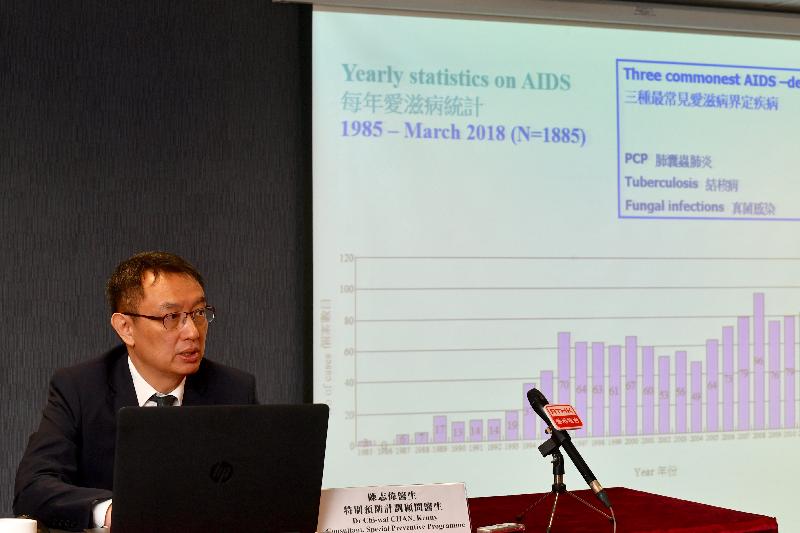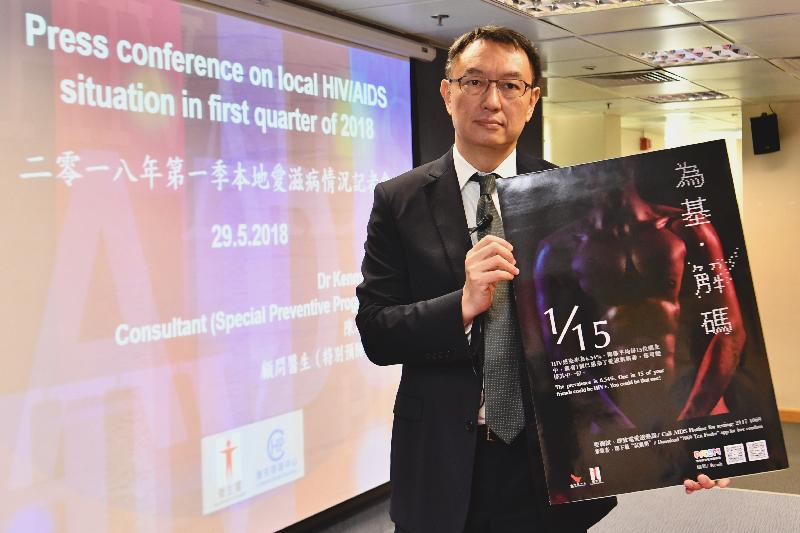CHP reviews local HIV/AIDS situation in first quarter of 2018 (with photos)
***************************************************************************
Reviewing the latest HIV/Acquired Immune Deficiency Syndrome (AIDS) situation in Hong Kong at a press conference today (May 29), the Consultant (Special Preventive Programme) of the CHP, Dr Kenny Chan, said that sexual transmission remained the major mode of HIV transmission.
"HIV is the cause of AIDS and, without treatment, about half of HIV-infected people will progress to AIDS within 10 years. On the contrary, early HIV treatment prevents AIDS and significantly prolongs survival," he said, urging HIV-positive people to seek specialist care as soon as possible.
Dr Chan also stressed the importance of proper use of condoms in reducing the risk of contracting HIV. Men who have sex with men (MSM), who dominate the epidemic, are strongly urged to use a condom for safer sex.
Of the 142 HIV cases, 122 males and 20 females, reported in the above quarter, 71 acquired the infection via homosexual or bisexual contact, and 20 via heterosexual contact. The routes of transmission of the remaining 51 cases have yet to be determined due to inadequate information.
The new cases were reported by three major sources: public hospitals and clinics (64 cases), the DH's Social Hygiene Clinics (21 cases) and private hospitals and clinics (20 cases). Among them, 79 (58 per cent) have already received HIV specialist services at the DH or the Hospital Authority.
In addition, 28 new cases of AIDS were reported in the above quarter, bringing to 1 885 the total number of confirmed AIDS cases reported since 1985. Among the new cases, 71 per cent were attributed to homosexual or bisexual contact and 18 per cent were related to heterosexual contact.
In the above quarter, the most common AIDS-defining illness was Pneumocystis pneumonia, a kind of chest infection.
The findings of the latest community-based HIV Prevalence and Risk Behavioural Survey of Men who have sex with men (PRiSM) conducted by the CHP in 2017 were also announced at today's press conference. PRiSM 2017, which was the fourth since the survey was first conducted in 2006, recruited some 4 100 MSM and 100 male-to-female transgender persons via websites, mobile applications, venues serving sexual minorities and AIDS organisations. Participants were asked to complete an online questionnaire on an anonymous, confidential and voluntary basis. Results of the latest PRiSM found that the HIV prevalence for sexually active MSM was 6.54 per cent while that for male-to-female transgender women was 5.11 per cent. The HIV testing rate in the past 12 months among MSM (52.6 per cent) was higher than that of the last survey in 2011 (41 per cent).
Dr Chan pointed out that the percentage of consistent condom use (defined as using a condom every time) in the preceding six months among MSM remained unsatisfactory (52 per cent). The percentage of recreational drug/substance use before and during sex (commonly known as "chemsex") in the past six months (16.2 per cent) was higher than that of the previous round of PRiSM conducted in 2011 (12.3 per cent). Of note, "chemsex" increases the risk of transmission of HIV and other sexually transmitted infections between sexual partners.
"With respect to the latest findings, we will step up our efforts in promotion and public education in the MSM community in order to make them aware of the importance of safe sex in preventing AIDS. We will also remind members of the public, particularly high-risk groups, to use a condom consistently and properly. Those with a history of unsafe sex should take an HIV antibody test early," Dr Chan said.
"Drug users should avoid sharing needles with others and receive methadone or other appropriate treatment as soon as possible," Dr Chan stressed.
Other findings and further details of the PRiSM survey have been uploaded to the DH's Virtual AIDS Office. The public can call the DH's AIDS Hotline (2780 2211) for a free, anonymous and confidential HIV test. The public may visit the Red Ribbon Centre (www.rrc.gov.hk), the AIDS Hotline website (www.27802211.com), the Gay Men HIV Information website (www.21171069.com) and the Harm Reduction website (www.harmreduction.gov.hk) for more information on HIV/AIDS.
Ends/Tuesday, May 29, 2018
Issued at HKT 12:16
Issued at HKT 12:16
NNNN






